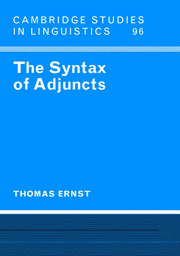Book contents
- Frontmatter
- Contents
- Acknowledgments
- 1 Introduction
- 2 The Semantics of Predicational Adverbs
- 3 The Scopal Basis of Adverb Licensing
- 4 Arguments for Right-Adjunction
- 5 Noncanonical Orders and the Structure of VP
- 6 Event-Internal Adjuncts
- 7 Adjunct Licensing in the AuxRange
- 8 Adjuncts in Clause-Initial Projections
- 9 Conclusions and Prospects
- Notes
- References
- Name Index
- Languages Index
- Subject Index
3 - The Scopal Basis of Adverb Licensing
Published online by Cambridge University Press: 12 October 2009
- Frontmatter
- Contents
- Acknowledgments
- 1 Introduction
- 2 The Semantics of Predicational Adverbs
- 3 The Scopal Basis of Adverb Licensing
- 4 Arguments for Right-Adjunction
- 5 Noncanonical Orders and the Structure of VP
- 6 Event-Internal Adjuncts
- 7 Adjunct Licensing in the AuxRange
- 8 Adjuncts in Clause-Initial Projections
- 9 Conclusions and Prospects
- Notes
- References
- Name Index
- Languages Index
- Subject Index
Summary
Introduction
The Main Claim
The generative tradition has recognized at least since Jackendoff 1972 that the meaning of a given adverb has an effect on its distribution. The main question for syntactic theory is to determine how syntax and semantics interact. How much of adjunct distribution can be directly predicted from the semantics, how much must be mediated by purely syntactic principles, and precisely what form do the principles, and the interface, take? In this chapter I argue that the relationship is very direct, with little mediation. I claim that the most important determinant of adjunct licensing is an adjunct's scope (and other selectional) requirements, encoded as lexical properties and verified at LF, rather than syntactic feature licensing, as in Cinque 1999 and other current work; beyond this, relatively few syntactic principles are needed to predict the main facts of adjunct distribution. In particular, though purely syntactic features may occasionally be involved, they are largely independent of adjuncts per se.
This is a desirable result from a theoretical point of view, because it reduces complexity and redundancy in syntax by deriving as much as possible from lexical semantics and compositional rules, which are needed independently. I justify this scope-based theory in part by contrasting it with feature-based systems, such as Cinque's, in which all adverbs are licensed by being in the Spec of a particular (functional) head.
- Type
- Chapter
- Information
- The Syntax of Adjuncts , pp. 92 - 148Publisher: Cambridge University PressPrint publication year: 2001



